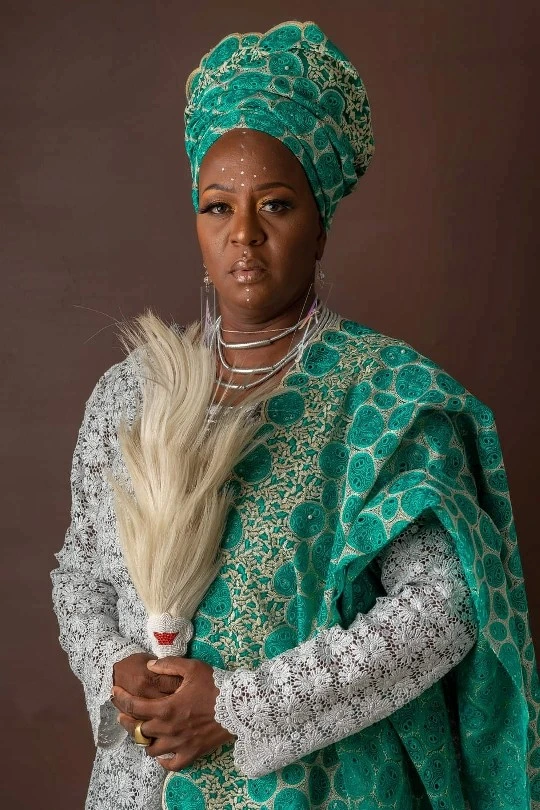By Kimberly Wallace, HER MAgazine
When millions of Africans were forced from their homes and sold into slavery, they were stripped of everything that was intrinsic to their identity- rituals, customs, language, and names. As pawns in the odious transatlantic slave trade, they had no choice.

One hundred and eighty-four years after her great, great, great grandmother was brought to Trinidad, recording artist, dancer, and talk show host Empress Ajé has reclaimed what was taken from her ancestors. Today, she stands tall and fearless, having rediscovered the pride and joy of her African identity.
On the eve of Emancipation Day, the indomitable singer, whose voice carries the struggles and joys of her ancestors, shares how the exploration of her roots led to her rebirth as Iya Ajetunmobi, or Empress Ajé.
Ajé was born Allison Bernard, the daughter of a housewife and the captain of the steelband Pandemonium. As an only child, she had to find ways to amuse herself; singing and entertaining came to her naturally.
While she did her chores, she sang along to her favourite songs. But when the men at the spiritual baptist church just across from where she lived began beating drums for their thanksgiving service, she would watch and listen with rapt attention. In spite of her very English name that was given to her at birth, Ajé always felt a strong pull towards her ancestral roots.
She loved running her hands over the colourful, vibrant designs of African print fabrics and the way her heart leapt in her throat at the sound of beating drums. That curiosity became much stronger as she got older and started wearing Afrocentric clothing. Deep inside, however, she felt an inward battle between what she wanted and what society expected.
‘Even though I was proud of my roots, I was intelligent enough to recognise that society didn’t accept them fully. As a teenager, I remember people telling me: ‘What happen to you? You feel you come from Africa or what?’ ‘So while I loved my African culture, I was confused.’
The path forward became clearer once she began delving into her family history. It was around that time she discovered that her great, great great grandmother, an enslaved African from Nigeria named Ade Jeri, was brought to Trinidad in 1838, just as slavery was abolished. She and others were given land to plant in Dieg Martin, on which Ajé’s family now calls home.
‘All this information fuelled me. I can’t explain the euphoria I felt,’she recalls. ‘What I learned about the African people really built up my self-esteem, which wasn’t at its highest when I was a young person growing up. Getting to know my ancestry and roots transformed me into the woman I am today.’ Ajé’s religious belief system-she is an Ifa Orisa initiate-also played an integral part in connecting the dots, she adds.
There is a saying, ‘you can’t know where you’re going until you know where you’ve come from’.
Ajé laments that many young people are living without purpose because they don’t know who they really are and where they come from.

‘Our youth don’t have a sense of belonging, they don’t know who they are because they don’t have the information. And, as with any other aspect of life, when you are ignorant of a subject, you operate in ignorance.
But once you get the facts, it empowers you to make decisions that will bring value to your life. Only when you love and appreciate who you are can you love and embrace others.
One of the most pivotal milestones in Ajé’s life came when she moved to La Horquetta and attended a Baptist church. There, her spiritual mother (now deceased) introduced her to Ella Andall, who would play an important role in her musical journey. The more Ajé explored her African identity through music, rituals, and customs, the more she became determined to take back what her ancestors lost.
After being stripped of their names, their ancestors were given the names of the plantation owner. As Ajé’s self-discovery and musical journey collided, she took on the name Sister Alli, then became known on the Calypso Monarch stage as ‘Warrior Empress’.
But the name brought her unnecessary battles, so her spiritual advisor, or babalawo, suggested something that aligned with who she had become. Therefore, she chose Ajé which came from her initiated African Yoruba name, Ajetunmobi.
‘I decided to remove the word ‘warrior’. Yes, I’m a fighter, but I don’t have to announce that to the universe. Instead, I embraced my African name and became Empress Ajé. Names have vibrations; they carry energy,’ she says.
Empress Ajé feels that she is finally fulfilling her destiny-the reason she was put on earth. ‘Our purpose on earth is to leave a legacy. As a Yoruba practitioner, I believe in ancestral energy, so when you take up the mantle of your family, you carry on your ancestral legacy. Other ethnicities, like the Indians, the Chinese, the Syrians, and the Lebanese, pay homage to their forefathers, but what has happened to the African man?

Even in 2022, we discriminate against those who practise African rituals,’ she says.
Ajé encourages people to take the time to explore their family history, which is essential to understanding their personal identity. A simple way to start is by speaking with older family members. It was through an ongoing conversation with her great aunt that Ajé uncovered her familial roots.
‘If you choose to live under a rock, then you will never be enlightened. The people who go forward are those who place themselves within the reach of information, process that information, and apply it in their lives,’ she says.
From being a young girl who struggled with embracing her identity, she has now fully reconnected with her roots and is planning a trip to the land of her ancestors.
Her pride is reflect ed in her uplifting Afrocentric music, which she has taken to new heights.
Ajé, who made her name in the calypso fraternity as Warrior Empress, has moved away from competitions and created her own space using the chantuelle rhythms.
She founded the groundbreaking annual event IBA which had its first show in 2019 at the Little Carib Theatre. IBA 2, a celebration of mothers, was held at the Naparima Bowl in May and featured Freetown Collective and Terri Lyons.
And on September 24, Ajé will be in the spotlight again as she and other performers host a musical tribute in honour of Andre Tanker at the Central Bank Auditorium.
August 1 marks the day slavery was abolished in the British Empire. For Ajé, a proud and fearless African descendant, Emancipation Day signifies a day of thanksgiving. ‘I don’t have a problem with people wanting to celebrate by getting dressed up and having a parade. For me, however, Emancipation Day goes far deeper. It’s about remembering my ancestors, those who went through the horrendous middle passage journey, those who cleared the path for me, and those whose character was founded on strength,’ says Empress Ajé.
‘When I’m going through my challenges and I feel like giving up, I think if they could survive the middle passage, what are you complaining about? and that gives me the motivation to go on. So Emancipation Day is a time to say thanks, remember their struggles, and do things that they can be proud of, so that they can say that there is a descendant of theirs who is upholding the traditions and is proud of her ancestry.’
